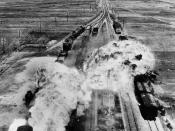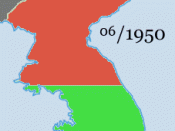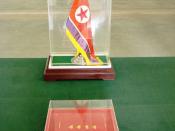The Korean War was started on June 25th, 1950 by North Korean troops crossing 38th Parallel into South Korea. The 38th Parallel was established after the surrender of Japan in 1945 by the Soviet and the US to separate their occupation zones in the Korean peninsular, which acted as the boundary between North Korea and South Korea. This civil war became a proxy war where China and Soviet were on one side and the US on the other. Even though it was called the "Forgotten War," it held a great importance in the course of the Cold War, because it was the first heated conflict in the Cold War, which nearly turned it into a "hot war." Therefore, its effects on the Cold War cannot be neglected. The effects could be looked upon from different standpoints.
Internationally, the war these two superpowers had on Korea made the Cold War globalize.
The conflict of the two ideologies the two superpowers had been deeper, however the tension between the Soviets and the US had eased a little after the Korean War. The threats of North Korea and China seemed to be gone when they signed the armistice, however an armistice is only a temporary cessation of fighting by mutual consent, which meant that South Korea might be caught off guard one day, if North Korea and China decided to invade it again. Some of the American officials also suspected this of a deception. They said that the US army must be strong and well prepared in case China broke the armistice, and if China really broke the armistice, the US should nuke it. On the other hand, the Chinese were unafraid of the American nuclear threats. According to military.china.com and many other Chinese websites, China was proud of its achievement or...


